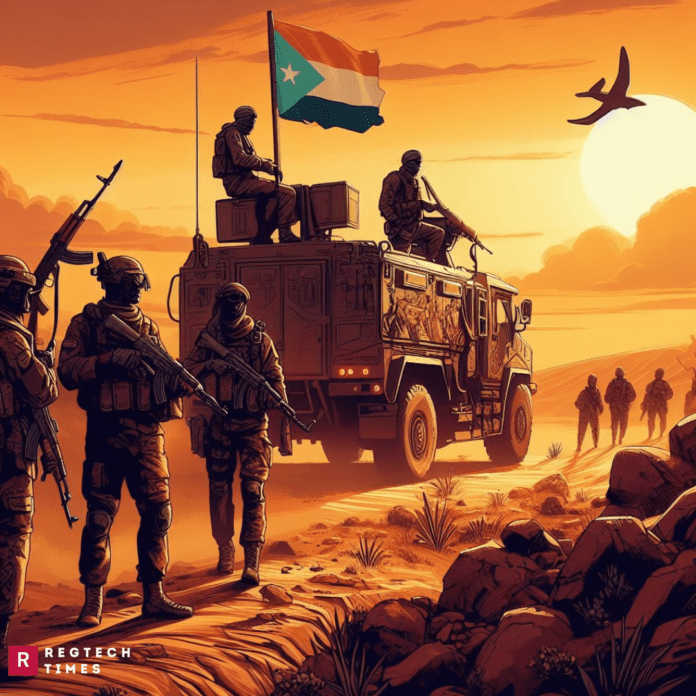As deadly violence continues to escalate in Sudan’s North Darfur region, the United States has taken decisive action by imposing sanctions on two commanders of Sudan’s paramilitary Rapid Support Forces (RSF). This move comes amidst growing concerns from rights groups and the United Nations about the deteriorating humanitarian situation in the area.
Sanctions Announcement: Targeting RSF Commanders
The US Department of the Treasury announced on Wednesday that sanctions were being levied against Ali Yagoub Gibril, the RSF’s Central Darfur commander, and Osman Mohamed Hamid Mohamed, a major-general overseeing the group’s operational planning. The decision underscores the seriousness of the situation and the international community’s commitment to holding accountable those responsible for human rights violations and atrocities.
Roots of Conflict: RSF’s Expansion and Control
Treasury official Brian Nelson highlighted the commanders’ focus on expanding territory and engaging in conflict, rather than addressing the Sudanese people’s calls for peace. The RSF’s recent encirclement of el-Fasher, the capital of North Darfur, has intensified fighting between the paramilitary group and the Sudanese Armed Forces, exacerbating an already volatile situation.
UN Concerns: Risks to Civilians and Infrastructure
UN Secretary-General Antonio Guterres has expressed grave concern over the escalating violence, warning that over 800,000 civilians are at risk in el-Fasher. Reports of heavy weaponry being used in densely populated areas have resulted in civilian casualties, displacement, and the destruction of critical infrastructure, further exacerbating the humanitarian crisis in the region.
Humanitarian Toll: Fatalities and Displacement
The conflict in Darfur has resulted in significant human suffering, with the UN estimating at least 15,500 fatalities and over 8.8 million people displaced across Sudan since April 2023. Both the RSF and the Sudanese Armed Forces have been accused of committing war crimes, including targeted attacks on civilians, highlighting the urgent need for accountability and justice.
Human Rights Concerns: Allegations of War Crimes
Human Rights Watch has raised serious concerns about the RSF’s role in committing war crimes, particularly targeting the non-Arab Masalit community in West Darfur. The organization has accused the RSF of killing thousands of people and destroying entire neighborhoods, underscoring the need for independent investigations into these allegations and accountability for those responsible.
Ethnic Tensions: Impact on Darfur’s Population
The fight for el-Fasher has raised concerns about exacerbating ethnic tensions and prolonging the conflict. Historically a center of power, el-Fasher’s capture has become a focal point for both sides. The RSF’s history of targeting non-Arab groups in Darfur has prompted some Darfuri groups to align themselves with the Sudanese Armed Forces against the RSF, viewing them as a greater threat.
Humanitarian Response: Addressing the Crisis
Amid the escalating violence, the medical charity Doctors Without Borders (MSF) has reported a significant increase in casualties at the South Hospital in el-Fasher. Dr. Prince Djuma Safari, MSF’s deputy medical coordinator, highlighted the challenges of providing medical assistance in the midst of intense fighting, emphasizing the urgent need for humanitarian aid and access to affected populations.
International Action: US Sanctions and Global Response
The US sanctions aim to freeze the assets of the sanctioned individuals within the country and prohibit any US citizens or entities from engaging in business with them. This move underscores the international community’s condemnation of the violence in Sudan and its commitment to holding accountable those responsible for human rights abuses and atrocities.
Conclusion: Urgent Action Needed
As the situation in Darfur continues to deteriorate, urgent action is needed to protect civilians and alleviate their suffering. The international community must work together to support efforts for peace and stability in Sudan, while holding accountable those perpetrating violence and obstructing humanitarian assistance. Only through concerted and coordinated efforts can lasting peace and security be achieved in Sudan’s troubled regions.


